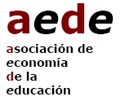CALL FOR PAPERS Abstracts and papers must be electronically submitted through the web application at:
https://2016.economicsofeducation.com/user/
Authors are invited to submit applied and theoretical papers in all areas of economics of education for presentation at the Meeting of the Economics of Education Association. There is a limitation of two papers submitted by each author.
Process of Submission
- The deadline for abstract submission is February 12th, 2016 (DEADLINE EXTENDED: February 22nd, 2016). Authors may also submit full papers at this time as well.
- For this first deadline, authors must also select a sub-heading under which they would like to submit their paper for evaluation. Sub-headings are listed below and will be used both in the evaluation process as well as in organizing presentations at the Meeting.
- Authors will then be notified by email of whether their abstract has passed the first round of evaluation for acceptance.
- All authors with accepted abstracts, who have not already done so, must upload a full paper by April 8tht, 2016 (DEADLINE EXTENDED: April 22nd, 2016). Those wanting their paper to be included in the published conference book must format their papers at this time according to the guidelines provided below.
- Full papers will then be evaluated by a scientific committee for acceptance to present at the conference and authors will be notified.
- Only accepted papers of registered members will be included in the final program.
Please note that all accepted papers will also be published in a conference book, unless authors indicate their preferences otherwise. However, to be included, authors must remember to format their paper according to the specifications below at the time of submission.
Relevant topics are organized in the following areas:
- Track 1: Demand for schooling, educational finance and equity:
- Demand for schooling and school choice
- Equity and inequality
- Education market, competition
- Comparative education
- Intergenerational mobility
- Track 2: Management and educational planning:
- University-business cooperation
- Educational finance and management
- Quality indicators. Rankings
- University Governance
- Third mission
- Entrepreneurship and educational organizations
- Comparative education
- Education policy
- Track 3: Educational production and efficiency:
- Education production
- Efficiency and productivity
- ICT and e-learning
- Determinants of academic performance (educational outcomes)
- School failure and drop out decisions
- Track 4: Education and labour market:
- Labour market and School-to-work transition
- Lifelong education and vocational training
- Education mismatch
- Track 5: Human capital and economic growth:
- Returns to education and economic impact of education
- Human capital, growth and economic development
- Track 6: Miscellaneous:
- Education and gender issues
- Immigration
- Satisfaction. Happiness
Instructions for authors:
- Abstract: No more than 300 words
- Type of file: editable format such as .odt, .doc, .docx, .rtf, or .tex
- File size: No more than 2.5MB
- Maximum length: 20 pages
- Paper size: A-4
- Font: Times New Roman
- Font size: 11pt
- Line spacing: 1.5 spaced
- Margins: Top 3 cm., Bottom 2 cm., Left 3.5 cm., Right 2.5 cm., Header 2 cm., Footer 1.5 cm.
Templates in diferent formats are available for this conference. Select the template that is most suitable for your operating system:
- Word XP 2003: AEDE conference template Word XP 2003
- Word XP 2007: AEDE conference template Word XP 2007
- OpenOffice: AEDE conference template OpenOffice
- RTF: AEDE conference template rtf



